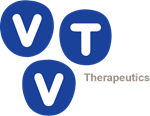Shareholder Tools
Press Release
View printer-friendly version << Back
vTv Therapeutics Presents Additional Positive Data from the Phase 2 Simplici-T1 Study in Patients with Type 1 Diabetes at 55th Annual Meeting of the European Association for the Study of Diabetes
In a poster titled “Results from the sentinel and learning phase of the Simplici-T1 study, the first clinical trial to test activation of glucokinase as an adjunctive treatment for type 1 diabetes”, Dr.
- TTP399 treatment (n=6) increased Time in Range from baseline to end of treatment by 11% (2.7 hours) (p=0.055) per day (24 hours), and by 12% (1.7 hours) (p=0.04) during the critical waking hours (
7am-9pm ) relative to placebo (n=9).
- TTP399 treatment reduced the total daily mealtime bolus insulin dose by 23% compared to 4% for placebo while significantly improving glycemic control.
- Patients in the treatment group experienced fewer Level 1 (≥54-70 mg/dl) and Level 2 (<54 mg/dl) hypoglycemic events than patients in the placebo group.
“These new clinical data enhance the very promising topline efficacy results we announced for this part of the study in June, where TTP399 reduced HbA1c levels by 0.7% relative to placebo,” said
A copy of the poster is available on the company website at http://vtvtherapeutics.com/publications/.
About the Simplici-T1 Study:
Simplici-T1 is a multi-center, randomized, double-blind, adaptive study assessing the pharmacokinetics, pharmacodynamics, safety and tolerability of TTP399 as an adjunct to insulin therapy in adult patients with T1D. The study is being conducted with support from JDRF, the leading global organization funding research in type 1 diabetes.
The Phase 2 learn-and-confirm study is being conducted in two parts to evaluate the safety and efficacy of TTP399 in T1D patients over twelve weeks of daily dosing. Part 1 enrolled 19 patients on both insulin pumps and CGMs. The topline results from Phase 2 - Part 1 were reported in
- The study met its primary endpoint of change in A1c from baseline after 12 weeks of treatment. Patients treated with TTP399 (n=8) showed a statistically significant mean reduction in HbA1c of 0.7% (p=0.03) at 12 weeks relative to the placebo group (n=11).
- TTP399 was well tolerated with similar incidences of treatment-emergent adverse events overall and by system organ class. The study had neither a serious adverse event nor an incident of diabetic ketoacidosis reported.
Part 2 is now fully-enrolled with patients utilizing a treatment regimen that includes either insulin pumps or multiple daily injection therapy, with CGMs optional. Topline results from the study are expected in the first quarter of 2020.
About
Forward-Looking Statements
This release contains forward-looking statements, which involve risks and uncertainties. These forward-looking statements can be identified by the use of forward-looking terminology, including the terms “anticipate,” “believe,” “could,” “estimate,” “expect,” “intend,” “may,” “plan,” “potential,” “predict,” “project,” “should,” “target,” “will,” “would” and, in each case, their negative or other various or comparable terminology. All statements other than statements of historical facts contained in this release, including statements regarding the timing of our clinical trials, our strategy, future operations, future financial position, future revenue, projected costs, prospects, plans, objectives of management and expected market growth are forward-looking statements. These statements involve known and unknown risks, uncertainties and other important factors that may cause our actual results, performance or achievements to be materially different from any future results, performance or achievements expressed or implied by the forward-looking statements. Important factors that could cause our results to vary from expectations include those described under the heading “Risk Factors” in our Annual Report on Form 10-K and our other filings with the
Contacts
Investors:
IR@vtvtherapeutics.com
or
Media:
212-572-5969
PR@vtvtherapeutics.com
Source: vTv Therapeutics Inc.
Investor Overview
- Investor Overview
- Stock Information
- Financial Information
- News & Events
- Corporate Governance
- Shareholder Services
